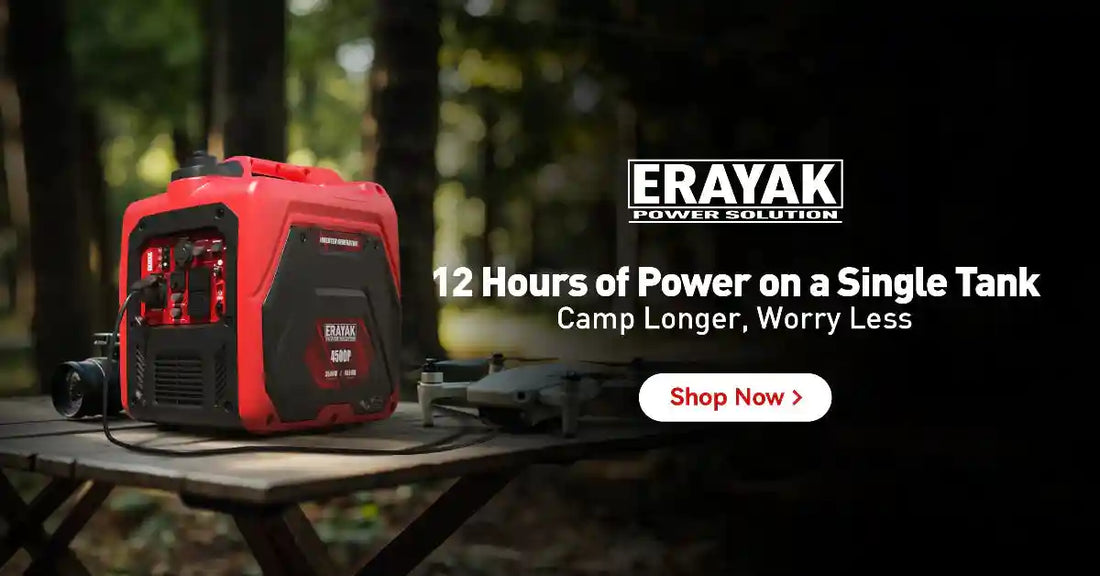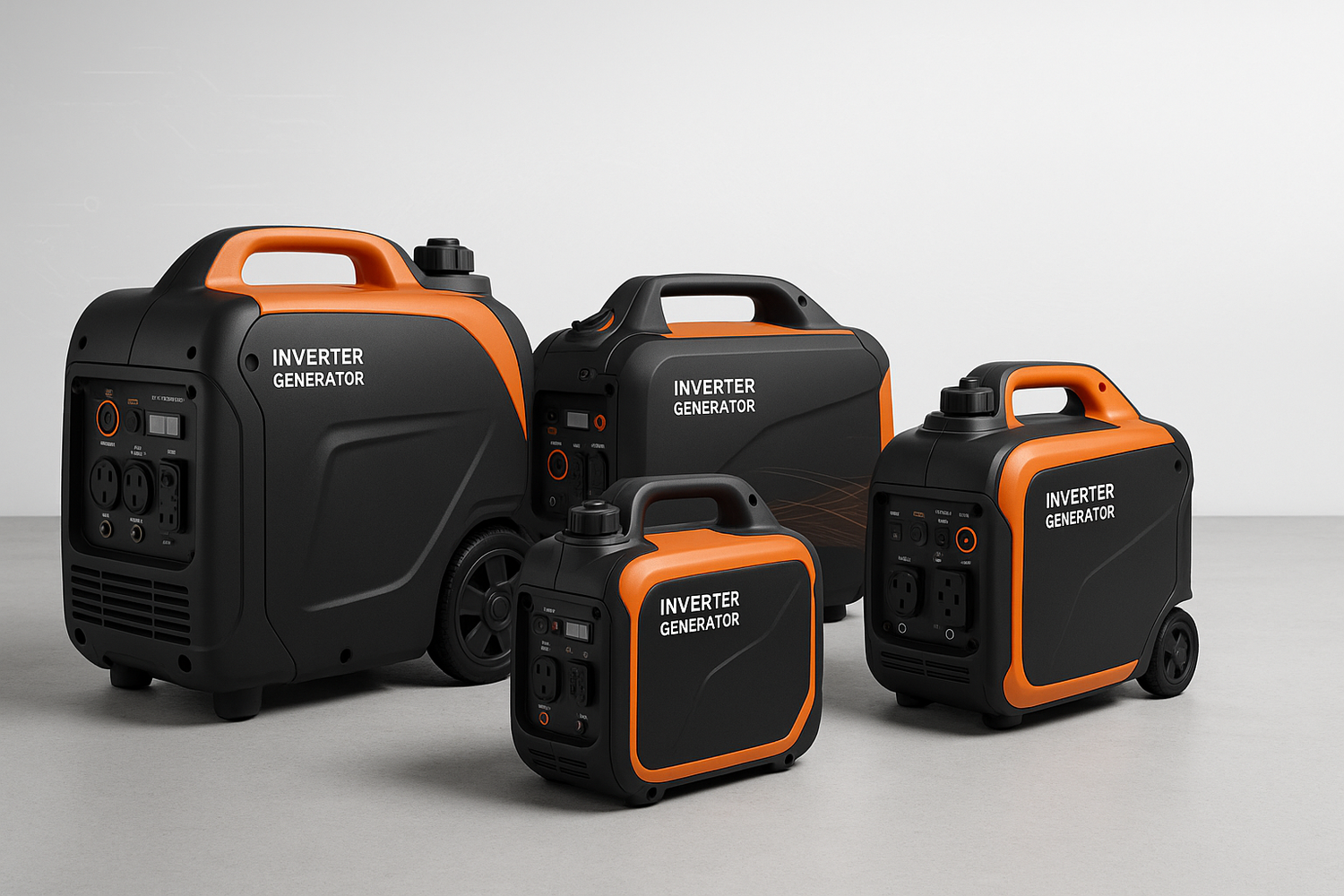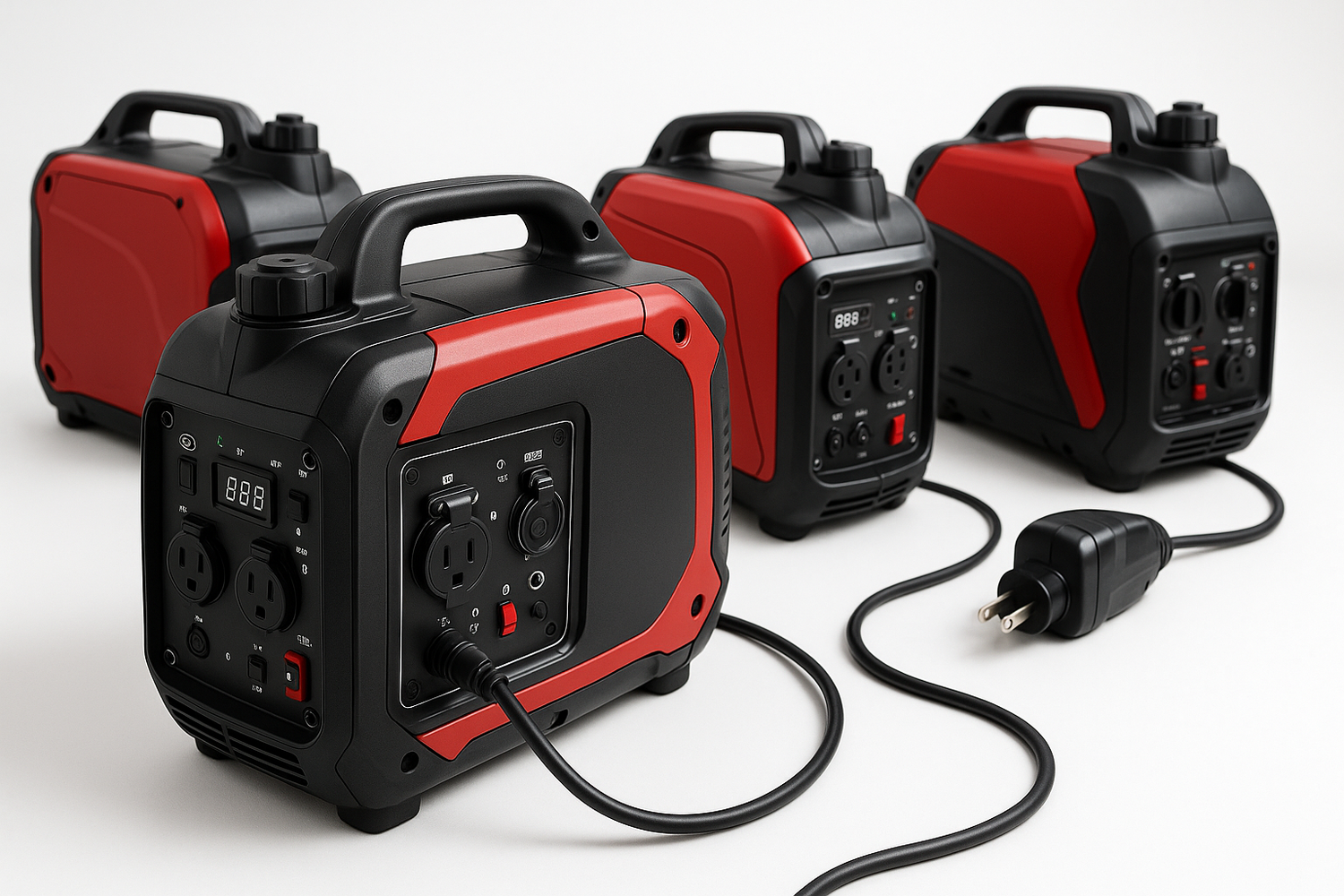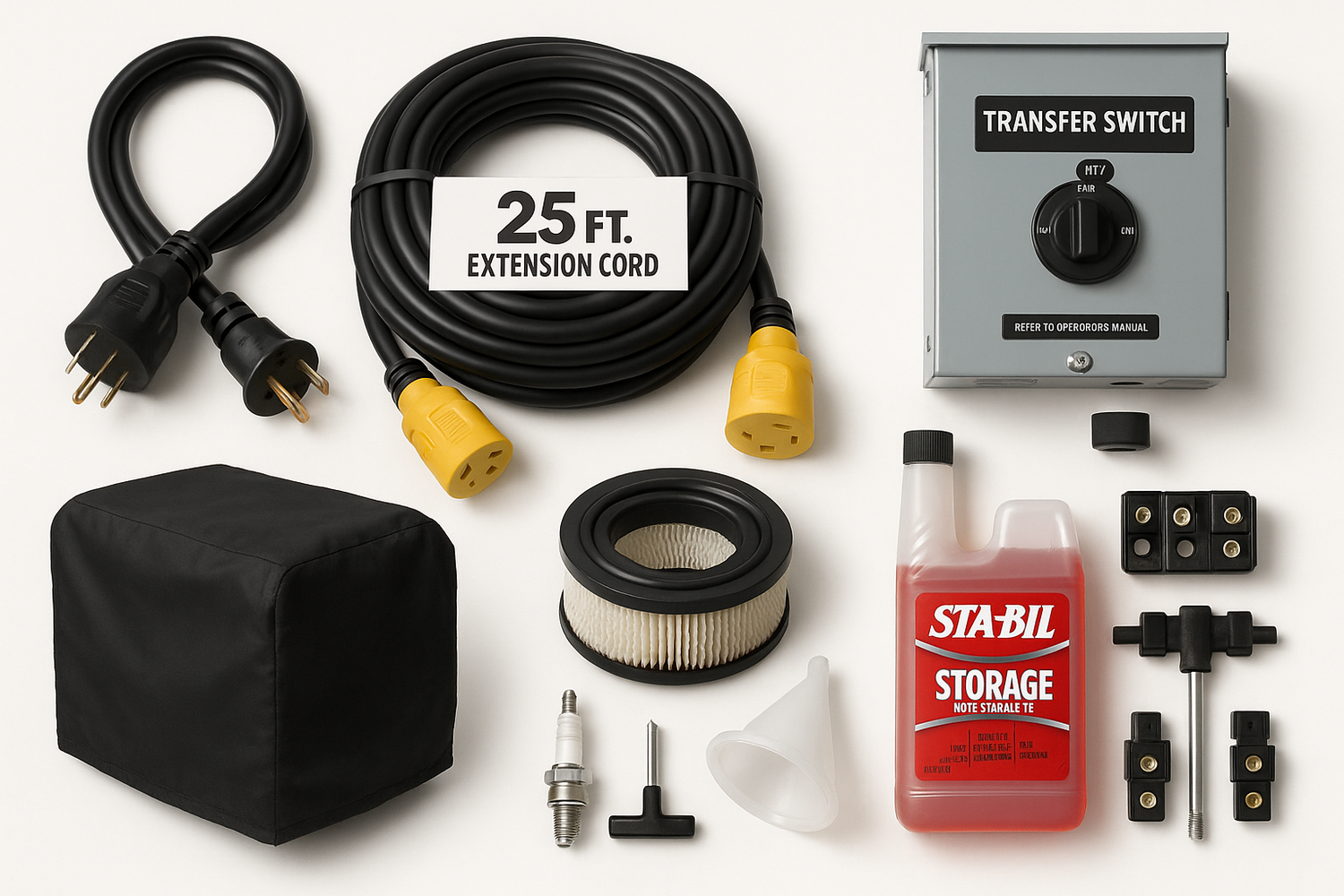
Optimal Generator Size for Campers: A Comprehensive Guide
Share
Choosing the Right Generator Size for Campers
Imagine arriving at your campsite, lights glowing softly and your fridge keeping food cold as the night settles in. The right generator size ensures these comforts without interruption.
Picking a generator that’s too small may leave you powerless, while an oversized unit can waste fuel and money.
This guide makes choosing the right generator size for campers simple. You’ll learn how to calculate power needs, explore quiet and portable options, and discover eco-friendly inverter models that keep camping peaceful and sustainable.
By the end, you’ll know exactly how to match your camper’s power demands with a reliable generator for every adventure.
Why Generator Size Matters for Campers
Generator size plays a vital role in determining your camping comfort and convenience. It affects your ability to run essential appliances.
Selecting the wrong size can cause power shortages or unnecessary fuel waste. This impacts your camping experience and budget negatively.
Evaluate your appliance usage patterns before making a decision. A mismatch between generator output and power demands can cause stress on the system.
Here's why generator size is crucial:
- Sufficient Power: Ensure all gadgets run smoothly.
- Efficiency: Avoid wasting fuel with an oversized unit.
- Flexibility: Adapt power needs as they change.
Lastly, a well-sized generator offers peace of mind. You gain confidence in sustaining your power needs effectively while camping. Power consistency makes a significant difference in enjoyment.
Understanding Your Camper’s Power Needs
To select the right generator, first assess your camper's power demands. This step ensures all devices function smoothly.
Identify all appliances you plan to use during your trip. Each appliance has specific wattage requirements that add to the total load.
Compile a list of each appliance's power needs for accuracy. Overlooking even small items can impact your overall power calculations.
Consider both comfort and necessity in your planning. Balancing luxury items with essentials prevents unnecessary power strain.
Factors to assess:
- Type of Appliances: Essential or luxury?
- Total Wattage: Add individual needs for a total estimate.
- Frequency of Use: Regular use or occasional?
By fully understanding your power needs, you'll choose a generator that ensures a stress-free camping experience. Accurately anticipating requirements maximizes generator performance and satisfaction.
Common Appliances and Their Wattage
Knowing the wattage of common camping appliances helps plan power requirements. Many devices have distinct power needs, affecting overall consumption.
List the appliances you'll use, noting each wattage. This aids in creating an accurate power profile for your camper.
Some typical wattages to consider:
- Refrigerator: 300-600 watts
- Microwave: 900-1200 watts
- Air Conditioner: 1000-2000 watts
- Television: 100-200 watts
Remember, specific models vary in power use, so always verify wattage. By doing so, you're prepared to match your generator capacity with actual needs. Taking inventory prevents surprises on your trip.
Starting vs. Running Watts Explained
Appliance power needs often differ between start-up and regular use. Most have two ratings: starting and running watts.
Starting watts refer to the extra surge of power required to start up. Running watts are the continuous power needed after starting.
Understand these ratings to avoid overloading your generator. Key differences include:
- Starting Watts: Brief spike during appliance start.
- Running Watts: Sustained power for operation.
- Variable Needs: Essential for motor-driven devices.
Factor both into your calculations to select an appropriately sized generator. This avoids system strain and maintains optimal performance.
Calculating Your Power Needs
Determining the right generator size begins with understanding your total wattage. List all appliances, note their starting and running watts, and add a small safety margin. For convenience, use a camping power needs calculator: simply enter appliance wattages, and it will estimate your combined load automatically. This ensures accuracy without manual math, helping you confidently select the best generator size for campers.
Generator Size Recommendations by Camper Type
Selecting the best generator size begins by matching it to your specific camper type. Each camper category has unique power demands, depending on its size and appliances used.
For small campers or teardrop trailers, a generator with 2000 to 3000 watts generally suffices. These campers often have basic electrical needs.
Mid-sized campers and travel trailers may require generators producing 3000 to 4000 watts. They typically use larger fridges and air conditioners.
For full-size RVs or fifth wheels, look for generators providing upwards of 5000 watts. These larger vehicles house numerous appliances and often need more power.
Consider these examples:
- Small Campers: 2000-3000 watts
- Mid-sized Trailers: 3000-4000 watts
- Large RVs: 5000+ watts
Matching your generator to your camper type ensures every appliance runs without issue. This tailored approach helps prevent any unexpected power shortages during your trips.
Generator Wattage for RV Air Conditioners
Air conditioners are often the most power-hungry RV appliances. Understanding their wattage needs is crucial to selecting the correct generator.
Typically, RV air conditioners require between 2000 and 4000 watts. This range depends on the unit size and model.
Consider the following wattage requirements for common RV air conditioners:
- 13,500 BTU Unit: 2750-3500 watts
- 15,000 BTU Unit: 3500-4000 watts
Ensure your generator meets or exceeds your air conditioner's starting wattage. This precaution prevents tripping breakers and ensures uninterrupted cooling.
RV Generator Size Chart
Utilizing an RV generator size chart can help match your power needs to the right generator. These charts simplify the selection process by cross-referencing RV types with necessary wattage.
Here's how to use a chart effectively:
| Camper / RV Type | Typical Appliances | Recommended Generator Size |
| Small Campers / Teardrops | Lights, fan, mini fridge, laptop | 2000–3000 watts |
| Mid-Sized Trailers | Refrigerator, microwave, small AC unit | 3000–4000 watts |
| Large RVs / Fifth Wheels | Full-size fridge, AC, multiple kitchen devices | 5000–7000 watts |
| Class A Motorhomes | Large AC (15,000 BTU), TV, stove, heater | 6000–8000 watts |
Can a 2000 Watt Generator Run a Camper?
A 2000 watt generator can power a camper, but its capabilities depend on your specific needs. It's best suited for smaller campers with limited appliances.
A 2000 watt generator can handle basic devices like lights, a fan, or small appliances. However, it may not support high-demand equipment like air conditioners.
Consider this list of typical power uses:
- Mini Fridge: 100-250 watts
- Fan: 50-100 watts
- Lights: 50-100 watts
Such a generator offers a good balance of power and portability for those with simpler camping needs. Ensure you calculate your total wattage to avoid overloading your generator.
Ultimately, while a 2000 watt generator suffices for basic tasks, it may fall short for larger power demands or longer camping trips.
Quiet and Portable Generators for Camping
The perfect generator for camping combines portability and quiet operation. Portability ensures ease of transport and setup, crucial for campers on the move.
Quiet generators enhance the tranquility of camping by minimizing noise. The lower the decibels (dB), the less disturbance you create.
When choosing a portable and quiet generator, consider:
- Weight: Lighter models for easy handling.
- Noise Level: Below 60 dB is ideal.
- Fuel Efficiency: Longer run time reduces refueling.
These generators are designed to blend into nature without the disruptive hum of traditional models. Ideal for maintaining peace without sacrificing power reliability.
Eco-Friendly and Inverter Generator Options
Environmentally conscious campers often opt for inverter generators. These generators provide cleaner energy, reducing emissions significantly.
An eco-friendly choice, inverter generators adjust power output to current demand. This maximizes fuel efficiency and minimizes noise.
When selecting an eco-friendly or inverter generator, consider these features:
- Low Emissions: Models that meet strict environmental standards.
- Fuel Efficiency: Longer operation per gallon.
- Clean Power: Safe for sensitive electronics.
Inverter generators excel at providing stable power ideal for tablets and smartphones. Their innovative technology supports a sustainable camping experience while delivering reliable energy.
Key Features to Look for in a Camping Generator
When selecting a camping generator, examine its essential features. Quality, convenience, and ease of use should drive your choice.
Durability matters. Generators built for the outdoors withstand rough conditions. Look for models built with durable materials to ensure longevity.
Ease of transport is a key feature. Portable generators often have wheels or carry handles for moving. This aspect ensures they’re perfect for campsite setups.
Here are important features to seek:
- Noise Level: Quiet operation to maintain peaceful camping.
- Runtime: Long hours per tank reduce frequent refueling.
- Safety Features: Overload protection and low-oil shutdown.
- User-friendly Controls: Simplified interface for ease of use.
Selecting a generator with these features enhances your camping experience. Reliable and efficient power solutions keep your adventures worry-free.
Safety, Maintenance, and Regulatory Considerations
Safety is paramount when using generators for camping. Prioritize models with built-in safeguards like overload protection. Check for low-oil shutoff to prevent engine damage.
Regular maintenance ensures your generator operates smoothly. Follow the manufacturer's guidelines for servicing. Clean the filter and change the oil regularly to prolong its lifespan.
Be aware of local regulations and campground rules. Some sites have specific noise limits and operational hours for generators. Compliance ensures peaceful coexistence with fellow campers.
Important considerations include:
- Safety Features: Overload protection, low-oil shutoff
- Regular Maintenance: Cleaning and servicing following manufacturer's guidelines
- Regulatory Compliance: Adhering to noise and operational restrictions
Choose a generator that aligns with safety, maintenance, and regulatory standards for a hassle-free experience.
Frequently Asked Questions
What size generator do I need for camping?
The size depends on your power needs. Calculate total wattage of devices you'll use simultaneously. Factor in extra for starting watts.
Can a 2000 watt generator run a camper?
Yes, but with limits. It can power basic appliances but may struggle with air conditioners or microwave ovens.
Why consider a quiet generator for camping?
Quiet generators enhance your outdoor experience. They reduce noise pollution and are often more eco-friendly.
What is a camping power needs calculator?
It's a tool that helps estimate power requirements. Input device wattage to determine the optimal generator size.
Key questions to consider:
- What are the main appliances to power?
- How important is noise reduction for your trip?
- What is the environment impact of your choice?
Conclusion: Making the Best Choice for Your Camping Experience
Ultimately, your choice should enhance your outdoor adventures, aligning with your goals of comfort and sustainability. Picture evenings under the stars with steady power for lights, cool drinks, and quiet comfort in your RV.
👉 Ready to upgrade your camping power? Discover the Erayak Portable Inverter Generator, designed for quiet, efficient, and reliable performance on every trip.
Learn more here: https://erayakpower.com/collections/portable-inverter-generators









